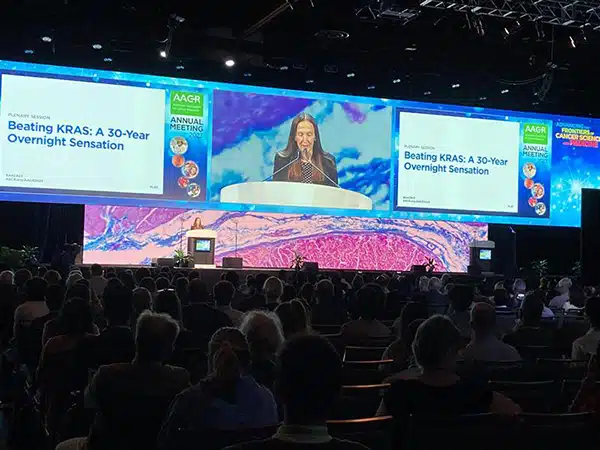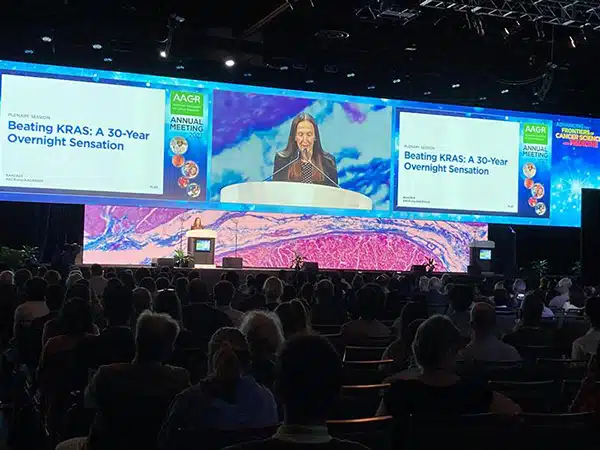
以下内容原文发布于AACR官方博客《Cancer Research Catalyst》, 中文内容仅做参考,请点击文末“阅读原文”,阅览原文内容。
AACR 2023年会全体会议于4月15日星期六拉开帷幕,会议专题是“战胜KRAS:30年研究进展”。
全体会议由Dafna Bar-Sagi博士主持,Bar-Sagi博士、Pasi Jänne博士、Beatriz Carreno博士和AACR前主席Frank McCormick博士作了专题发言。
发言介绍了自KRAS首次在人类细胞中被发现并被确定为一种致癌基因以来的40年间所取得的巨大成就,特别是过去30年里,专注于研发抑制KRAS蛋白促癌活性的治疗方法。
McCormick总结了1964年在小鼠中发现Hras蛋白以来与KRAS相关的重要发现,“这场竞赛实际上是在1992年或1993年开始的”。20世纪90年代初开始了“激酶研究浪潮”,开发了针对各种致癌激酶的抑制剂。虽然付出了巨大努力,KRAS抑制剂的研究收效甚微,致使许多人认为无法研发出针对这种蛋白的有效药物。
这种情况在2013年发生了改变,Kevan Shokat博士和同事发表了一项开创性的研究,显示可以针对KRAS进行药物开发。现在临床上已批准sotorasib(Lumakras)和adagrasib(Krazati)这两种药物用于治疗某些携带KRAS G12C突变的肺癌患者。

Dafna Bar-Sagi(PhD博士、AACR会士),主持了周六的全体会议和靶向KRAS的相关议题。
了解更多内容,请阅读以下原文。
AACR Annual Meeting 2023: Beating KRAS
By Neha J. Pancholi, PhD
The plenary program of the AACR Annual Meeting 2023 kicked off Saturday, April 15, with a session titled “Beating KRAS: A 30-year Overnight Sensation.”
The plenary session was chaired by Dafna Bar-Sagi, PhD, FAACR, and featured presentations from Bar-Sagi; Pasi Jänne, MD, PhD; Beatriz Carreno, PhD; and AACR Past President Frank McCormick, PhD, FAACR.
Discussions centered around the immense progress that has been made in the four decades since KRAS was first identified in human cells and determined to be an oncogene. The past 30 years in particular, speakers noted, have focused on developing therapies to inhibit the cancer-promoting activity of this protein.
“The race really got going around 1992 or 1993,” said McCormick, as he summarized significant findings throughout the history of KRAS, beginning with the 1964 discovery of the related Hras protein in mice. The early 1990s marked the beginning of the “kinase wave,” he noted, with the development of inhibitors targeting various kinases responsible for driving cancer. However, despite extensive efforts, inhibiting KRAS remained elusive, leading many to deem the protein “undruggable.”
That changed in 2013, when a seminal paper published by Kevan Shokat, PhD, FAACR, and colleagues indicated that KRAS might, in fact, be druggable. Today, two drugs, sotorasib (Lumakras) and adagrasib (Krazati), are clinically approved to treat patients with certain lung cancers that harbor the KRAS G12C mutation.

Dafna Bar-Sagi, PhD, FAACR, chaired the Saturday plenary session on targeting KRAS.
Ongoing research, such as the studies shared during this plenary session, aims to improve KRAS-targeted therapies by increasing responses, expanding the reach of inhibitors to other KRAS mutants, and circumventing treatment resistance.
In his presentation, McCormick highlighted some of the therapeutic approaches that are currently under evaluation to address these goals. He shared encouraging results from an investigational KRAS inhibitor, BBO-8520. Unlike sotorasib and adagrasib, which bind the inactive form of KRAS G12C, this compound targets the active form as well.
Due to this feature, McCormick explained, BBO-8520 inhibits RAS more quickly than either sotorasib or adagrasib because it avoids having to wait for RAS to cycle through from an active to an inactive state.
Jänne is also interested in inhibiting the active form of KRAS. He shared promising preclinical and clinical data illustrating the efficacy of investigational pan-KRAS inhibitors that target the active form of multiple KRAS mutants. He also discussed the potential of combining KRAS inhibitors with additional therapies, including immune checkpoint inhibitors.
Given the interest in combining KRAS-targeted therapeutics with immunotherapies, it is important to understand how KRAS mutations impact antitumor immunity, noted Bar-Sagi. She explained that the immune systems of RAS-mutated cancers are often dysregulated, opening opportunities for therapeutic intervention. “I think it’s going to be important in the future to identify both local and systemic nodes of immune modulation … in order to improve therapeutic success,” she said.
Researchers are also exploring harnessing the immune system in various ways to target KRAS-mutated cancers. Carreno reported that patients who received an investigational vaccine had T-cell responses against neoantigens found on KRAS-mutated cancers. Additionally, T cells engineered to recognize these neoantigens effectively killed patient-derived cancer cell lines and led to tumor regression in mouse models. The use of bispecific T cells and haptens to augment immune responses are also under investigation.
These discussions expand on research presented at the AACR Special Conference: Targeting RAS, held March 5-8. Research advances shared at the meeting were summarized in a recent blog post.
During the AACR Special Conference: Targeting RAS, prominent KRAS researchers provided perspectives on the past, present, and future of targeting KRAS. Their insights are captured in a recent AACR Stories video, featuring McCormick; Bar-Sagi; Shokat; Mariano Barbacid, PhD, FAACR; Andrew Aguirre, MD, PhD; and AACR Past President David Tuveson, MD, PhD, FAACR.
阅读更多内容,请点击“阅读原文”
AACR
结尾
责任编辑:肿瘤资讯-Bree
排版编辑:肿瘤资讯-Astrid
免责声明
本文仅供专业人士参看,文中内容仅代表癌症研究UPDATE立场与观点,不代表肿瘤资讯平台意见,且肿瘤资讯并不承担任何连带责任。若有任何侵权问题,请联系删除。












 苏公网安备32059002004080号
苏公网安备32059002004080号


